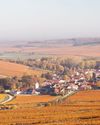
In the past decade, winemakers in Chile and Argentina have moved beyond what was seen as the final frontier for South American viticulture and into the cool climates and wild terrains of Patagonia. Growing confidence and expertise; a quest for lower temperatures and greater water availability in the face of climate change; and a thirst for adventure – all of these factors are leading the current generation of winemakers further south.
The sparsely populated wilderness of Patagonia, at the tail end of the continent, has enraptured voyagers for centuries. When the famed 16th-century explorer Ferdinand Magellan sailed around these southern archipelagoes, he described it as the land of giants – the land of the patagón.
Patagonia is indeed nothing short of giantic: 1 million km 2 of land surrounded by three oceans. Awe-inspiring landscapes range from hanging glaciers, mountain peaks and dense forests to snowcapped volcanoes, wind-whipped deserts and crystal-clear lakes.
In Argentina, Patagonia begins at the Huincul Fault or the Neuquén Basin, where the Río Negro runs eastwards, providing fertile lands that have been planted with vines for over a century. No one, however, dared plant further south, where temperatures dropped, winds picked up and conditions grew harsher. The feasible viticultural limit was seen as 39°S.
Virgin terrain
What Patagonia did offer, though, was excellent fly-fishing. And it was on one such fishing trip that Mendoza vine-grower Bernardo Weinert pondered how the conditions looked remarkably similar to those of another favourite fishing spot of his: Oregon in the US – where he’d tasted decent local wine.
Denne historien er fra October 2019-utgaven av Decanter.
Start din 7-dagers gratis prøveperiode på Magzter GOLD for å få tilgang til tusenvis av utvalgte premiumhistorier og 9000+ magasiner og aviser.
Allerede abonnent ? Logg på
Denne historien er fra October 2019-utgaven av Decanter.
Start din 7-dagers gratis prøveperiode på Magzter GOLD for å få tilgang til tusenvis av utvalgte premiumhistorier og 9000+ magasiner og aviser.
Allerede abonnent? Logg på

Wine lover's guide to ALSACE
Pretty postcard villages, delicious food, fascinating history and, of course, excellent wines - this beautiful northeastern corner of France has everything a wine lover could ask for

José Pizarro does Christmas Spanish style
In a Decanter exclusive, the celebrated chef offers up an alternative menu for the seasonal celebration

Perfect whiskies for wine lovers at Christmas
What better gift could there be for a wine and whisky lover than a whisky matured in barrels previously used for wine? Our selection of 12 great bottles shows just why it can be a match made in heaven

WHITE CHATEAU
Hitherto a bit-part player, the white wines of this celebrated southern Rhône region are well placed to find themselves increasingly in the spotlight, as a result of the changing climate conditions. Our Rhône expert recommends 20 of his favourite examples to seek out

Chablis 2023
Variable weather made it challenging at times, but a late hot spell came to the rescue, resulting in plenty of good wines for drinking and for keeping. Having tasted almost 400 Chablis 2023 wines, our expert selects 30 of his favourites, along with five from top producers in neighbouring crus

Looking BACK, looking AHEAD
As 2024 draws to a close, we asked eight of our regular contributors to nominate their most memorable wine experiences of the year and to reveal what they're anticipating most in their plans for 2025

25 TOP SYRAH/SHIRAZ REDS
Two names, a multitude of personalities. For almost two centuries, Syrah has been woven into the fabric of the southern hemisphere's wine world. Today, it makes some of the most exciting and terroir-expressive wines to be found south of equator, with a growing shift towards single-site bottlings

A Resource for the World? - Argentina is unique in the genetic diversity preserved in much of its vine material. With climate change and disease posing increasing threats worldwide, Catena Zapata winery is asking what lessons can be learned to protect vineyards within and beyond the nation's borders
Argentina is unique in the genetic diversity preserved in much of its vine material. With climate change and disease posing increasing threats worldwide, Catena Zapata winery is asking what lessons can be learned to protect vineyards within and beyond the nation’s borders

Great Cabernets of South America
Other varieties may hog the limelight across South America, but the world’s most popular grape for red wines has played a critical role in the continent's wine heritage. We trace Cabernet Sauvignon’s story here, and recommend 16 benchmark wines to try

PROVENCE by train and bike
With rail links to Paris, Nice, Marseilles and beyond, a vast network of cycle paths and quiet roads, and a plethora of historic wine estates, Provence is an ideal destination for an eco-friendly, car-free and carefree) holiday